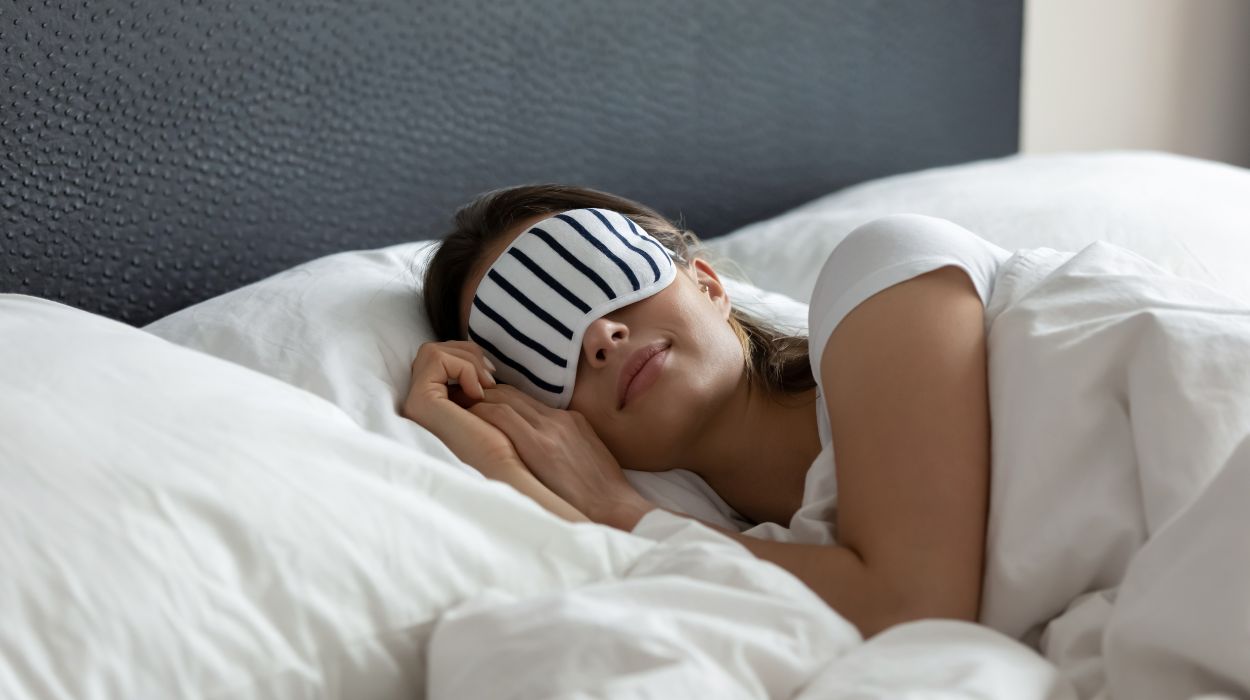When you think about the lifestyle changes required for weight loss success, you probably imagine diet and exercise. While these are necessary components for weight loss, it’s also important to consider sleep.
Getting enough sleep[1] can actually play a role in successful weight loss. On the other hand, restricted sleep can impede weight loss efforts.
Below, learn about the relationship between sleep and weight loss. You’ll learn about topics like how many calories you burn while sleeping. You’ll also learn strategies for promoting quality sleep for weight loss and the effects of sleep deprivation.
Sleep And Weight Loss: Is There Connection?
Yes, there is a relationship between sleep and weight loss. Sufficient sleep[1] has been found to be linked to successful weight loss. People who get enough sleep are more likely to lose weight. Inadequate sleep can lead to overeating[1] and make it hard to drop excess weight. Sufficient sleep duration can therefore help you meet your weight loss goals.
The Connection Between Sleep And Weight Loss

Diet and exercise are essential for weight loss, but getting 7-9 hours of sleep[2] each night is also important. There are various ways that your sleep schedule impacts weight loss. These are discussed in more detail below.
Sleep And Energy Intake
To lose weight, you need to consume fewer calories per day, so you’re in a calorie deficit. This means you’re burning more calories than you eat each day. Sleep patterns can influence your daily calorie or energy intake and affect weight loss.
Sleep research has found that when people undergo experimental sleep restriction, they consume more calories per day.[1] In one study, when people slept 5.5 compared to 8.5 hours per night, they consumed more[1] high-carb snacks and, thus, more calories total.
A meta-analysis found that when people are[3] sleep-deprived, they consume an average of 385 more calories per day. Excess calorie intake in sleep-deprived participants can lead to a positive energy balance. Over time, poor sleep patterns will cause weight gain rather than weight loss.
When people sleep less, they are awake for longer. This means they have more opportunities to snack throughout the day. This ultimately leads to increased calorie intake, impeding weight loss, and a higher body mass index.
Hormonal Fluctuations
Insufficient sleep can reduce weight loss effectiveness because of alterations in endocrine system[1] functioning. When people are sleep-deprived, they feel hungrier because of changes in hormone levels. They are also less sensitive to insulin when sleep-deprived.
Other hormonal changes[1] that occur with poor sleep include increases in levels of cortisol and ghrelin in the evening. This is problematic because cortisol is associated with stress, whereas ghrelin promotes hunger.
Sleep restriction[1] also leads to decreased leptin levels, which creates additional problems. Leptin is the hormone involved in satiety. So, when you’re sleep-deprived, you might not feel as full after eating.
These hormonal changes can make it difficult to stick to weight loss interventions. When levels of hunger hormones are high, it’s difficult to maintain a caloric deficit. A person with sleep loss will feel chronically hungry, making it more likely they’ll increase their food intake.
Hunger And Cravings With Sleep Curtailment
When people are chronically sleep deprived, they experience more intense hunger and cravings. Research with men with a normal body weight has found that short sleep duration increases hunger by 24%.[1]
Research on women with a normal BMI has found that sleep curtailment leads to increased hunger. In one study, women who regularly slept 7-9 hours a night experienced one night of sleep deprivation. The next day, they experienced more hunger and more intense cravings,[4] and they consumed more chocolate and larger portion sizes.
When you don’t get enough sleep, resisting temptation is harder. Cravings and increased hunger make you more likely to give in and indulge.
Reduced Physical Activity
There isn’t as much research showing a relationship between lack of sleep and physical activity. However, some research suggests that people might be less active when they sleep less.
One study with working adults found that those who maintained a regular sleep schedule were more active.[5] They were also less likely to have a sedentary lifestyle. People with a consistent sleep schedule had a similar schedule on workdays and non-workdays.
It makes sense that getting enough sleep can promote physical activity. After all, research has shown that people experience daytime sleepiness[4] after a night of short sleep duration. If you’re too tired to exercise, you’ll miss out on an opportunity to burn more calories.
You might be worried that sleeping more will reduce your opportunities to burn calories through exercise. However, you burn calories, even when sleeping. The total calorie burn[6] will vary based on your body composition.
Weight Loss Maintenance
Sleep doesn’t just play a role in successful weight loss; It is also linked to weight loss maintenance. People who fall asleep at consistent times[7] each night are less likely to experience weight gain after losing weight.
Disruptions in hormones[1] associated with appetite regulation not only affect weight loss; they can also lead to weight gain. So, after you’ve lost weight, it’s important to maintain a healthy sleep schedule. Otherwise, you might begin to overeat, causing you to gain the weight back.
Best Time To Sleep And Wake Up For Weight Loss
It’s pretty clear that there’s a relationship between weight loss and sleep. People who don’t get enough sleep[1] are more likely to overeat. They experience food cravings and increased appetite, which makes it difficult to eat in a calorie deficit for weight loss.
Given these facts, getting enough sleep is important if you’re trying to lose weight. You might wonder when you should go to bed and wake up for weight loss. In reality, it’s not as simple as going to bed at a specific time.
Setting a consistent, adequate sleep schedule is more important for weight loss. Research shows that people are more successful with weight loss when they have a consistent sleep schedule.[8]
A consistent sleep schedule is important to overcome the effects of lack of sleep and problems with weight loss. Consider what time you need to wake up in the morning for work or other obligations. Then, choose a bedtime that allows for adequate sleep, and stick to the same bedtime, even on weekends.
How To Improve Your Sleep For Weight Loss

A consistent sleep schedule that allows for good sleep quality and adequate sleep time is essential. This is especially true if you want to avoid weight gain and improve your body composition. If you’re struggling to maintain normal sleep patterns, consider the steps below to improve sleep quality.
Create A Consistent Sleep Schedule
Sufficient sleep combined with a consistent sleep schedule is important for promoting weight loss;[8] If you’re struggling with sleep deprivation, a consistent sleep schedule is the first step toward addressing the issue. Pick a bedtime that allows for 7-9 hours of nightly sleep, and stay close to this bedtime, even on weekends.
Consistent sleep schedules, with the same daily bedtime and wakeup time, have been found to be important for health.[9] If you’re trying to lose weight, now is the time to focus on a regular sleep schedule.
Get Plenty Of Exercise
If you’re struggling with disturbed sleep, getting more exercise could help. Research shows that exercise can improve sleep quality.[10]
People who exercise regularly tend to have reduced[10] sleep onset latency, meaning they fall asleep faster. If you’re looking for tips on how to fall asleep fast, exercise could be the answer.
Exercise can also increase total sleep time,[10] as well as sleep efficiency. This means you’ll spend more time in bed, actually asleep.
If you’re trying to lose weight, you’re probably adding exercise to your routine anyway. Make exercise a priority, and sleep could also improve, making weight loss easier.
Practice Good Sleep Hygiene
Good sleep hygiene[11] has been identified as central to treating people with sleep deprivation. Proper sleep hygiene includes creating a relaxing bedtime routine and limiting light exposure later in the day. This means putting away devices like cell phones and laptops and reading or doing something relaxing before bed.
It is also important to avoid substances that can interfere with sleep. These include alcohol and caffeine.[11] Consumed too close to bedtime, they can lead to disrupted sleep.
Caffeine[12] can cause increased sleep onset latency, as well as reduced total sleep time. It can also reduce slow-wave sleep and lead to more awakenings during the night. To avoid sleep disturbance, stopping caffeine consumption from coffee 8.8 hours before bedtime is recommended.
Engage In Yoga Or Meditation
Mindfulness-based practices like yoga and meditation are often used for stress reduction. They can also have a beneficial impact on sleep.
Meditation for weight loss and sleep doesn’t have to be time-consuming. Research has found that small doses of meditation[13] can reduce stress and improve sleep.
You can find meditation videos online to help you get started. Incorporate meditation into your evening routine to relax the body for sleep.
Seek Treatment For Sleep Disorders
Sometimes poor sleep quality is due to an underlying sleep disorder, such as obstructive sleep apnea. If you’re experiencing disturbed sleep and it’s not improving, it might be time to see a sleep medicine doctor.
Sleep apnea and weight loss can be complicated. Untreated sleep apnea[14] leads to frequent awakenings, fragmented sleep, and poor sleep quality. Treatment with a CPAP machine[15] can improve sleep quality and reduce daytime sleepiness.
Interestingly, weight loss can also reduce the severity[16] of sleep apnea. If sleep apnea is the culprit, seeking treatment will improve your sleep and your weight loss efforts. With weight loss, sleep apnea is also likely to improve.
There are other sleep disorders beyond sleep apnea. Insomnia and restless leg syndrome[17] could also be keeping you awake at night. See a sleep medicine specialist for treatment if you think you might have a sleep disorder.
Conclusion
The sleep and weight loss relationship is pretty strong. People who get enough sleep and maintain a consistent sleep schedule tend to lose more weight.[8] On the other hand, sleeping too little is linked to increased food intake,[1] which can impede weight loss.
If you want to increase your chances of weight loss success, it’s important to prioritize sleep. This means following proper sleep hygiene practices to promote good sleep quality and making time for adequate sleep.
Take note of your current sleep habits. If you’re currently sleeping under 7 hours per night, it’s time to make changes. Power down the devices a little earlier, and prioritize getting to bed on time.
You might need to make some changes to your usual habits, but being well-rested will pay off. You’ll be less tempted to indulge in high-calorie foods and more energized for your workouts. All of this adds up to increased chances of success with weight loss.
Frequently Asked Questions
Lack of sleep[18] affects several hormones involved in metabolic processes. It increases ghrelin levels which can increase hunger. It also reduces levels of the satiety hormone leptin. Finally, sleep loss can weaken the nighttime decline in cortisol.
Experts recommend losing 5%-15%[19] of body weight over six months. Losing 100 pounds in three months is excessive. This level of weight loss in such a short time would be difficult to maintain and would likely require extreme measures.
Good sleep hygiene seems to play a role in belly fat loss. People who sleep 7-9 hours per night lose more size[8] from their waists than those who sleep under 6 hours. This suggests adequate sleep can promote belly fat loss.
Sleep is important for weight loss because sleep restriction[1] can lead to increased appetite and higher food intake. These factors can make it difficult to stick to a weight-loss diet.
People who are overweight may experience poor sleep quality[20] or fragmented sleep. Because their sleep is not restorative, they may spend more time in bed. The exact cause of the link between long sleep duration and overweight is not known.
 Evidence Based
Evidence Based
